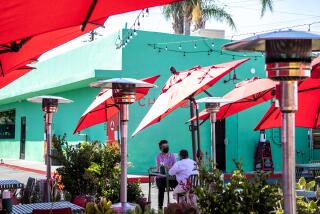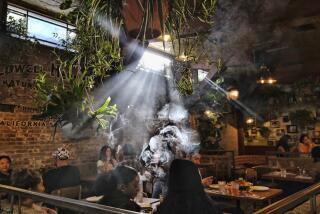Steakhouse Owner Says Smoking Ban Just Hot Air
- Share via
Unlike a lot of restaurateurs, Tony Minero was prepared to be a fan of California’s no-smoking-in-bars law.
The 51-year-old owner of Minero’s Steakhouse in the Palms district of Los Angeles was recovering from open-heart surgery and didn’t want to breathe secondhand smoke.
But what’s killing Minero these days is feeling as though he’s the last honest man.
The problem, he says, is that he’s losing substantial business for following a law that is being widely disobeyed and receiving minimal enforcement.
Most tavern owners who are grumbling publicly about the smoking ban hate the fact that cigarettes and cigars have been legally prohibited in bars since Jan. 1.
Minero, on the other hand, wishes authorities would put some teeth into the law.
“I believe that if they enforce the law and people don’t have the option to go where there’s smoking, business will level out,” he said. But the way things stand, Minero feels more like a proprietor who refused to serve liquor during Prohibition. “The speak-easies became very popular,” he noted.
A study by a national beverage institute last week found that one-fourth of California’s bars were still allowing smokers to light up in violation of the new law, which is designed to protect employees from secondhand smoke. Enforcement efforts--left up to each city and county--have been largely passive.
During a recent afternoon happy hour, Minero winced as he looked around his steak joint with its red leather-esque menus and dark faux-wood tables and saw only a single bar customer.
This was not how he imagined things working out.
When he opened the restaurant in November, Minero thought he was about to take advantage of a rising anti-smoking tide. California had banned smoking in restaurants in 1995 but kept extending the deadline for bar owners until this year.
Before his most recent venture, Minero owned a bar and grill near Santa Monica’s Third Street Promenade. He said he accepted the haze of smoke that often hung in the bar air as befitting a casual joint near the beach.
Minero had been a smoker off and on, to say nothing of spending substantial time in smoky confines. But when doctors diagnosed hardening of the arteries and suggested he might have suffered a minor heart attack, he was ready to call it quits with the restaurant business.
The option of opening a nonsmoking restaurant seemed unrealistic.
“Eating red meat, drinking alcohol, smoking--it all goes together,” he said.
Then the Legislature decided to stop delaying the ban on bar smoking. By last fall it became apparent that the prohibition would go into effect New Year’s Day, and Minero changed his mind about a career switch.
Confident that the state government was on his side, he opened Minero’s and proudly placed his single ashtray outside. Once the law took effect, he pointed people toward the door when they asked to light up.
Alas, many bars have apparently been subtly or openly signaling smokers to stick around. Therein lies the problem, Minero said. The late-night bar crowd in particular comes to his place after being somewhere else--where they smoked to their hearts’ content. TV news programs have aired features about restaurant “smoke-ins” in defiance of the bar smoking ban, quoting owners who vow to shutter their doors before shutting out smokers.
So when Minero kindly asks patrons to snuff out their cigs, citing state law, more than a few customers balk and take their business elsewhere, he said.
“I’m convinced they leave thinking I’m the bad guy, because I’m the only one enforcing it,” he said. “What they think now is that I’m not being one of the rebels and standing up to the government.”
Los Angeles Fire Capt. John Kitchens, who is in charge of enforcing the code within city limits, is sympathetic. He’s the first to say there is almost no enforcement in Los Angeles of the state law, adding that he has not been given the authority or personnel to do it.
Authorities can fine a bar owner or patron $50 for a first offense under the code. Repeated offenses can fetch fines of $250 and--if Cal/OSHA determines that the smoking endangers employees’ health--up to $7,000.
But not a single restaurant--governed by anti-smoking codes since 1995--or bar in the city of Los Angeles has ever received a smoking fine, Kitchens said.
“I am not allowed to go out and proactively enforce the law,” he said. “I cannot go out and make a sweep, because that’s the way the city attorney has set up the program.
“It’s a blue law. It’s unenforceable and meaningless, and because it’s not being enforced in my opinion, it doesn’t make sense to have it on the books,” he said.
Even the complaint process is unwieldy, Kitchens said.
After a complaint is made to a telephone hotline, a letter is sent to a business owner, explaining the state law. After a second complaint--if it is received more than a week after the first--another letter is sent.
“To escalate the process to a field investigation, there must be at least three separate complaints, each lodged at least one week apart,” says the Los Angeles Fire Department on the “Anti-Smoking Ordinance Enforcement” section of its World Wide Web site.
Kitchens said that 50 complaints about the same bar, if called in on the same day, register as one complaint. Since the first of the year, only one bar has reached the field inspection stage, he said.
The county also sends letters if it, rather than the city, is notified. Since Jan. 1, Los Angeles County has sent 914 informational letters, said Lucy Robinson of the Department of Health Services. But her agency is not charged with enforcement, only education, she said.
All of which means that Minero and other law-abiding business owners might have to continue taking the heat--or the smoke--of their customers.
“They passed a law; they’re not enforcing the law--they’re making me enforce the law, and I’m getting some very negative responses,” Minero said. “Smokers stop coming in. They just go somewhere else.”
More to Read
Eat your way across L.A.
Get our weekly Tasting Notes newsletter for reviews, news and more.
You may occasionally receive promotional content from the Los Angeles Times.







